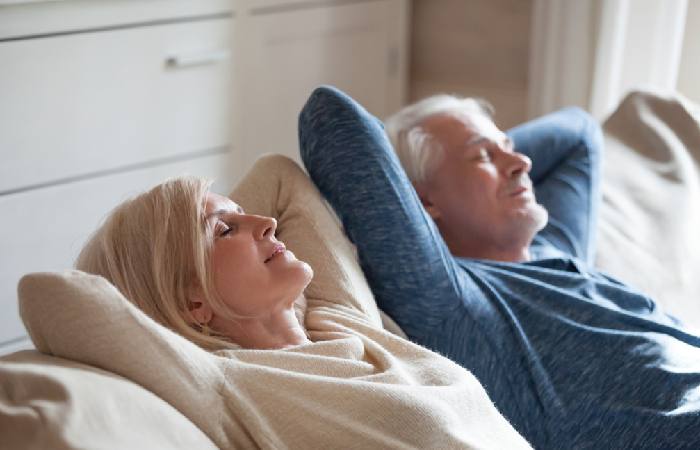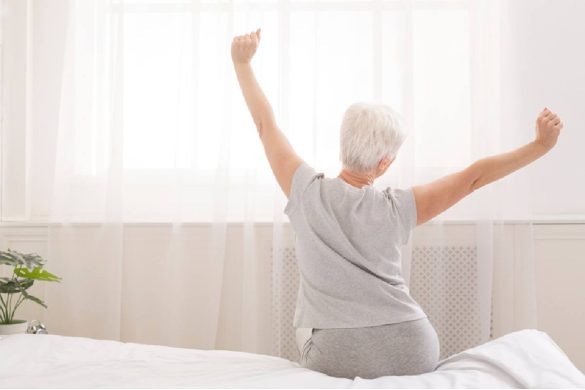A Senior’s Guide to More Restful Sleep – As we age, our sleep patterns often change. Unfortunately, for many, it’s not for the better. Poor sleep can lead to various problems, including an increased risk of falls, accidents, chronic pain, depression, anxiety and weakened immune systems. It can also make it more challenging to manage chronic conditions like diabetes, heart disease and high blood pressure.
Several things can contribute to poor sleep as we age. Physical changes like arthritis or menopause can make it difficult to get comfortable and fall asleep. Mental and emotional issues like worry, stress and grief can also keep us up at night. And environmental factors like noise, light and temperature can also have an impact. Fortunately, there are many things seniors can do to promote better sleep. From investing in high-quality bedroom essentials to lifestyle changes, here are a few of our favorite tips for more restful sleep.
Understand the Causes of Poor Sleep in Seniors
As we age, getting quality sleep often becomes an increasingly difficult task for several reasons. As a result, seniors may find themselves tossing and turning all night, unable to fall into a restful sleep. But why is this the case? In order to understand how to get better sleep as a senior, it is important first to identify the causes of poor sleep.
Physical Factors
Poor sleep in seniors can be attributed to physical factors like arthritis, back pain and other aches and pains that can make it challenging to get comfortable in bed. Additionally, age-related hormonal changes like menopause can also disrupt sleep patterns and cause restlessness. Finally, chronic conditions such as diabetes or heart disease may also contribute to chronic fatigue and make it difficult for seniors to fall asleep comfortably.
Mental and Emotional Factors
Mental and emotional factors can also contribute to poor sleep in seniors. As we age, our mental health can take a toll, and seniors are often more susceptible to depression and anxiety. Unfortunately, these issues may be overlook or ignored by caregivers or family members. When left untreated, mental health issues can seriously impact the quality of sleep, leading to difficulty falling asleep, staying asleep and overall restlessness at night.
Environmental Factors
Uncomfortable beds and pillows, noisy neighbors or family members, warm or cold temperatures, bright lighting, and pets in the bedroom can all disrupt sleep patterns and cause restlessness. Some of these might be things that were all right in the past — like having your cat or dog sleep in your bed — may no longer work out as well.
Strategies for Achieving Better and More Restful Sleep as a Senior
Prioritize Your Bed
If you’re getting the nightly recommended amount of sleep but still feeling exhausted during the day, it might be time to make some changes. Creating the perfect sleep space is essential for promoting good quality of sleep in seniors. The following items should be taken into consideration when considering an upgrade to your sleeping area:
- Mattress – Looking at all the mattresses on the market can be overwhelming. Memory foam and natural latex mattresses are favorites of many seniors because of their pressure-point relief and breathability.
- Pillows – A supportive pillow is essential for comfortable sleep, but it should also be suited to the individual. Side sleepers should look for a firmer pillow that supports the neck and shoulders. In contrast, back sleepers may prefer a softer, fluffier pillow.
- Linens – Too many people ignore the quality of their bed linens and then wonder why they’re not getting the restful sleep they need. Choose natural, breathable materials like cotton or bamboo and remember to opt for higher thread counts whenever possible.
- Bed Frame – A strong, durable and sturdy bed frame is essential for good sleep for seniors. The frame should be sturdy and provide adequate support for both the mattress and the individual. Adjustable beds are a great option for seniors, as they offer the ability to adjust the head and foot of the bed for better comfort.

Make Your Room a Sleep Sanctuary
Creating the perfect sleep environment is essential for promoting good quality of sleep in seniors. All aspects of the bedroom should be considered, from temperature to lighting. Small changes can make a big difference when it comes to achieving more restful sleep as a senior. Here are some tips for creating a sleep sanctuary:
- Give pets their own bed.
- Use blackout curtains to block out light.
- Add a white noise machine or fan to create soothing ambient sound.
- Use a humidifier to increase humidity levels in dry climates.
- Keep electronics like cell phones and TVs out of the bedroom.
- Maintain comfortable temperatures between 60-68 degrees Fahrenheit.
Maintain Healthy Lifestyle Habits
Seniors should maintain healthy lifestyle habits to promote good quality of sleep. For example, getting enough light exposure during the day is essential for our body’s natural biological clock and circadian rhythm. So avoid the temptation to stay isolated in a room with the curtains drawn and get out in the sunshine. Exercise is also crucial for good sleep, so aim to get at least 30 minutes of physical activity daily.

Additionally, eating a balanced diet with plenty of fruits, vegetables and other nutrient-rich foods will promote better sleep. Finally, staying away from caffeinated drinks or sugary snacks before bedtime is recommended, as these may disrupt your regular sleeping cycle.
Take Action
If you are a senior or a caregiver of a senior and you think that restlessness during the night might be related to an underlying medical issue or mental health disorder, it’s essential to take action. Speak with your doctor or healthcare provider about any issues you are having with sleep and ask for their advice on what steps can be taken to improve your sleep quality. If necessary, they may refer you to a sleep specialist who can provide more targeted treatment options.
Final Thoughts
Seniors can promote better sleep and improve their overall quality of life by creating a restful sleep environment, engaging in regular physical activity, and maintaining healthy lifestyle habits. With just a few simple adjustments, everyone can achieve the good night’s rest they need.


